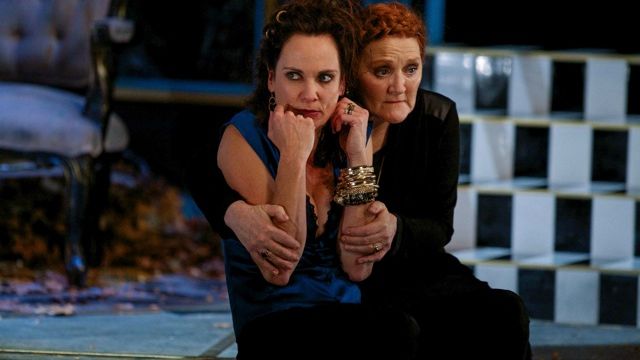Phèdre
Bell Shakespeare continues to raise the bar in presenting us “The Classics.” This time it’s Racine’s play of Euripedes’ Greek tragedy Phèdre, translated by Ted Hughes. Much of it is not a literal poetic translation, and just as well, for Racine’s play is a product of its time and teeters between Tragedy and Melodrama. So, although the story and most of the exquisite language remains intact, Hughes has taken some of the edge off the OTT tragedy and allowed us the relief of some black comedy instead.
Phèdre is the latest wife of heroic King Theseus, he who killed the minotaur. When Theseus is lost, presumed dead, Phèdre confesses that the mystery illness killing her is her secret lust for her stepson. She is horrified by her own incestuous passion and cannot live with her own shame. Such is the nature of Tragedy – these days we would tell her to build a bridge and get over it. Hippolytus rejects her and when Theseus returns, rather than be exposed, Phèdre goes along with a plan to accuse Hippolytus of rape, which causes his angry father, with wounded pride, to entreat the god Neptune to kill him. It ends with most of the principals dead and Phèdre succumbing to her own poisoning. It’s a plot that has seen many outings in many forms – I’ve used it myself in various television serials.
 Why then, is Phèdre still relevant theatre? Apart from its poetic beauty, it is to French Theatre what Hamlet is to English speaking theatre – a magnificent character study of someone driven by circumstances and emotions they should control, but cannot. Phèdreis addicted, even though she hates what she has become, and this allows us to feel some sympathy for a bitch who brings the world crashing down around a kingdom’s ears. She is the original Dramaqueen, and though we might be tempted to say “Get a Life” she provides perhaps the definitive female role for the actor.
Why then, is Phèdre still relevant theatre? Apart from its poetic beauty, it is to French Theatre what Hamlet is to English speaking theatre – a magnificent character study of someone driven by circumstances and emotions they should control, but cannot. Phèdreis addicted, even though she hates what she has become, and this allows us to feel some sympathy for a bitch who brings the world crashing down around a kingdom’s ears. She is the original Dramaqueen, and though we might be tempted to say “Get a Life” she provides perhaps the definitive female role for the actor.
Catherine McClements gives a fine compelling performance of gaunt, glossless glamour, of hunger beyond starvation, of guilt beyond redemption. It is not a role we would expect from her, but she wears the mantle like a second skin. Julie Forsyth is a worthy foil as the maid Oenone, whose motives are questionable in driving her mistress to ultimate destruction. Her performance is pitched perfectly to complement, but never draw focus from McClements. Newcomer Edmund Lembke-Hogan, only one year out from drama school, is a real find. His intensity and emotional truth made Hippolytus far more than a naïve sex symbol. Marco Chiappi as Theseus has the freedom of the stage and his strutting and bellowing are totally convincing of the hero king, whilst his hearbreaking remorse is deeply touching late in the play. Bert Labonte (Theramene), that most versatile of actors, doesn’t have a chance to shine until his 11th hour speech in the second act. Then, his stillness and compassion show what fine sensitivities he has as an actor.
Peter Evans UN-blocks the first 15 minutes of Act One. His characters are still, like statues telling their stories. This allows us to synchronise with the rhythm of the language without distraction. Even when they do move it is little and seldom; such is the scope of the tragedy that it needs no physicality to embellish it. Confused at first by the staging, by the end of the play I was in awe of the brave choices in directing. Anna Cordingley’s set is a stroke of genius. With a modern dress interpretation of a 2,500 year old play, she links the two time frames cleverly by choosing Racine’s period – a portent of the French Revolution to come, all decadence and decay with a caved in roof and the furniture rotting. It’s a breathtaking choice and works brilliantly as a bridge between ancient and modern.
Phèdre is not an easy play to engage with. It requires the audience to allow the rawness of overt emotion to touch them. But for those brave enough to do that, it’s a thoroughly rewarding night of theatre.
Coral Drouyn
Images: (top) Catherine McClements & Julie Forsyth and (lower) Catherine McClements & Edmund Lembke-Hogan.
Subscribe to our E-Newsletter, buy our latest print edition or find a Performing Arts book at Book Nook.

